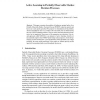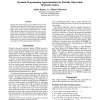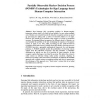350 search results - page 6 / 70 » Complexity of Planning with Partial Observability |
ECML
2005
Springer
14 years 2 months ago
2005
Springer
This paper examines the problem of finding an optimal policy for a Partially Observable Markov Decision Process (POMDP) when the model is not known or is only poorly specified. W...
IROS
2006
IEEE
14 years 3 months ago
2006
IEEE
— An important problem in robotics is planning and selecting actions for goal-directed behavior in noisy uncertain environments. The problem is typically addressed within the fra...
AROBOTS
2008
13 years 7 months ago
2008
Abstract Many elderly and physically impaired people experience difficulties when maneuvering a powered wheelchair. In order to provide improved maneuvering, powered wheelchairs ha...
FLAIRS
2009
13 years 7 months ago
2009
Partially observable stochastic games (POSGs) provide a rich mathematical framework for planning under uncertainty by a group of agents. However, this modeling advantage comes wit...
HCI
2009
13 years 7 months ago
2009
Sign language (SL) recognition modules in human-computer interaction systems need to be both fast and reliable. In cases where multiple sets of features are extracted from the SL d...



